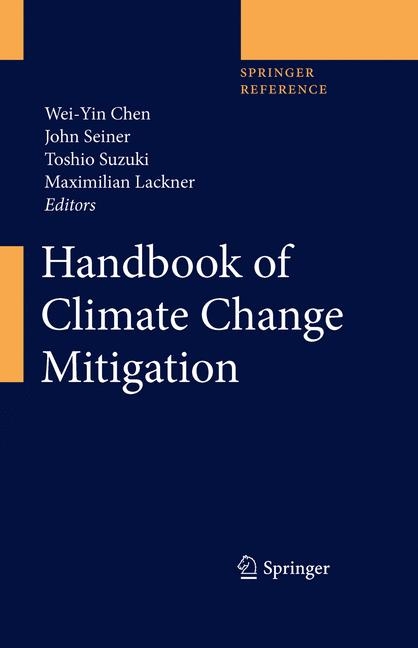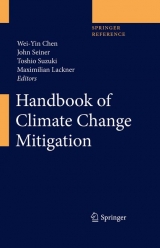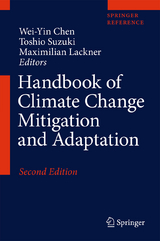Handbook of Climate Change Mitigation
Springer-Verlag New York Inc.
978-1-4419-7990-2 (ISBN)
- Titel ist leider vergriffen;
keine Neuauflage - Artikel merken
There is a mounting consensus that human behavior is changing the global climate and its consequence could be catastrophic. Reducing the 24 billion metric tons of carbon dioxide emissions from stationary and mobile sources is a gigantic task involving both technological challenges and monumental financial and societal costs. The pursuit of sustainable energy resources, environment, and economy has become a complex issue of global scale that affects the daily life of every citizen of the world. The present mitigation activities range from energy conservation, carbon-neutral energy conversions, carbon advanced combustion process that produce no greenhouse gases and that enable carbon capture and sequestion, to other advanced technologies. From its causes and impacts to its solutions, the issues surrounding climate change involve multidisciplinary science and technology. This handbook will provide a single source of this information. The book will be divided into the following sections: Scientific Evidence of Climate Change and Societal Issues, Impacts of Climate Change, Energy Conservation, Alternative Energies, Advanced Combustion, Advanced Technologies, and Education and Outreach.
Dr. Wei-Yin Chen is a professor of chemical engineering at the University of Mississippi. He has been investigating fossil fuel conversions and emissions control since 1975. His recent research interests include advanced combustion and emissions control for stationary and mobile sources. Four patent applications are pending. He organized a climate change study group that has been offering courses, developing outreach programs and collaborating on research projects. He has been a panelist of the National Science Foundation, US Department of Energy, US Environmental Protection Agency, and Chang-Jiang Scholar Program of China. Dr. Chen has received both the outstanding teaching and the outstanding research awards from the School of Engineering, the University of Mississippi. Dr. John M. Seiner is Director of the National Center for Physical Acoustics and Professor of Mechanical Engineering, University of Mississippi. Dr. Maximilian Lackner received his PhD in technical chemistry from the Vienna University of Technology/Austria in 2003 and his habilitation in chemical engineering in 2009. He has authored 80 publications and edited several books. Dr. Lackner is lecturing at Vienna University of Technology on combustion and ignition. He serves on the advisory board of the Association of German Engineers (VDI) in Eastern Austria and is a reviewer for the US DOE. After working 2 years in China, he has returned to Europe to run a startup company for anti-microbial surfaces. The technology, which is based on the acid protection mantle of the human skin, can avoid infections in hospitals and bring substantial energy savings in industry, e.g. in cooling towers and hot water systems, to contribute to the mitigation of climate change. Dr. Toshio Suzuki is a research scientist for the National Institute of Advanced Industrial Science and Technology (AIST), Nagoya, Japan, working on the development of micro tubular SOFCs. Before joining AIST, he worked as an Assistant Research Professor at the University of Missouri - Rolla (now Missouri University of Science and Technology), on single chamber SOFCs and low temperature ceramic processing for SOFC components. He earned his M.S. in Applied Physics at Tohoku University, Sendai, Japan, and his Ph.D. in Ceramic Engineering from the University of Missouri - Rolla.
Introduction.- Part I. Scientific Evidences of Climate Change and Societal Issues. Climate Change - Evidences and Contrarian Viewpoints.- Carbon Emissions and Human Activities.- 4. Natural Climatic Archives: Overview and Discussion of Proxy Data.- 5. Chemistry and Physics of CO2.- Climate Change and U.S. Laws.- Climate Change and International Protocols.- Ethics and Environmental Policy.- Mass Media Roles in Climate Change Mitigation.- Energy Economics.- Emission Trading.- Venture Capital Investment and Trend in Clean Technologies.- Part II. Impact of Climate Change.- Carbon Liability.- Impacts of Climatic Changes on Biogeochemical Cycling in Terrestrial Ecosystems.- Climate Change and Dynamics of Soil Carbon Cycle.- Effects of Climate Change on Costal Flood.- Impact of Climate Change on Biodiversity.- Impacts of Climatic Changes on Water Quality and Fish Habitat in Aquatic Systems.- Part III. Energy Conservation.- Energy Efficient Design on Future Transportation Systems.- Building Design for Energy Conservation.- Thermal Energy Storage and Transport.- Greenhouse Gas Reduction from Chemical Processing.- Mobile and Arial Sources of Greenhouse Gases and Abatement Strategies.- Part IV. Alternative Energies.- Biochemical Conversion of Biomass.- Thermal Conversion of Biomass.- Hydrogen Production.- Nuclear Energy and Environmental Impact.- Harvesting Solar Energy using Inexpensive and Benign Materials.- Solar Concentrators.- Wind Energy.- Geothermal Energy.- Hydropower.- Part V. Advanced Combustion.- Carbon Capture and Sequestration.- Chemical Absorption.- Oxy-Fuel Combustion.- Integrated Gasification Combined Cycle (IGCC) .- Conversion of Syngas to Fuels.- Chemical Looping.- Integrated O2-Transport Membrane.- Part VI. Advanced Technologies.- Low Temperature Fuel Cells.- Solid Oxide Fuel Cells.- Molten Carbonate Fuel Cells.- Photocatalytic Reduction of CO2 and Water Splitting.- Geoengineering Strategy for Global Climate Stabilization.- Technological Options for Reducing Non-CO2 GHG Emissions.- Thermoacoustics.- Part VII. Education and Outreach.- Developing a Climate Literate Society Through Education.- An Introductory Course on Climate Change.
| Reihe/Serie | Handbook of Climate Change Mitigation | 1.10 |
|---|---|
| Zusatzinfo | biography |
| Verlagsort | New York, NY |
| Sprache | englisch |
| Maße | 155 x 235 mm |
| Gewicht | 3990 g |
| Themenwelt | Naturwissenschaften ► Biologie ► Ökologie / Naturschutz |
| Naturwissenschaften ► Chemie ► Analytische Chemie | |
| Naturwissenschaften ► Chemie ► Physikalische Chemie | |
| Naturwissenschaften ► Chemie ► Technische Chemie | |
| Naturwissenschaften ► Geowissenschaften ► Meteorologie / Klimatologie | |
| Technik ► Elektrotechnik / Energietechnik | |
| Technik ► Umwelttechnik / Biotechnologie | |
| ISBN-10 | 1-4419-7990-5 / 1441979905 |
| ISBN-13 | 978-1-4419-7990-2 / 9781441979902 |
| Zustand | Neuware |
| Haben Sie eine Frage zum Produkt? |
aus dem Bereich





